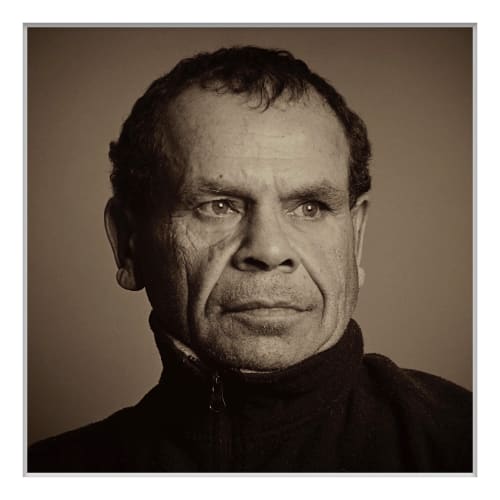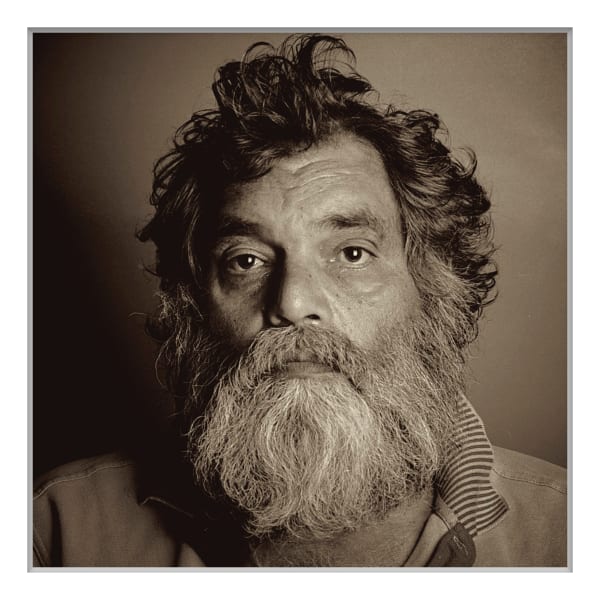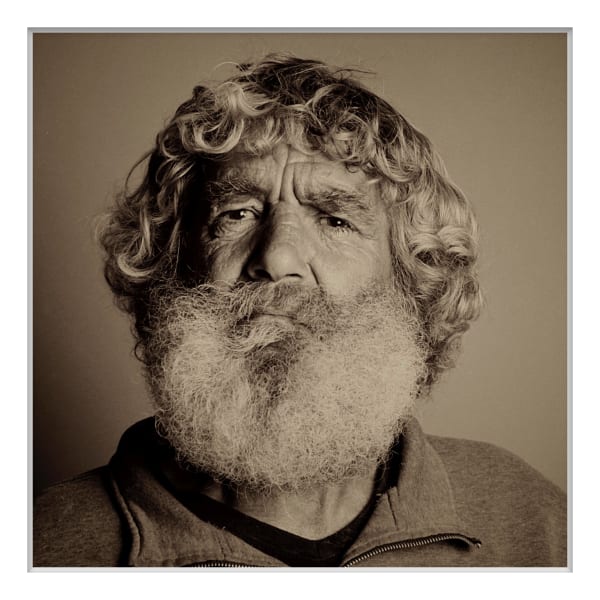Saddened Were the Hearts of Many Men
“Where are all our men”, was a response to a body of work that was created some fifteen years ago titled “The Elders Album”. A project that was donated to the Aboriginal Elders Council in Tasmania those heart felt portraits still line the walls of the community hall of the Council and they remind us of their beauty and significance in our social history.
It was quite some time ago that I began a close observation and inquiry into how our men in the community were being affected by their diminishing role in society. Noticing the spread of anxiety and depression in a large section of our community directed squarely at men’s issues. It was clear of its devastating affects on their families and individual health. I was scarred by many premature deaths and the memory of those funerals I attended. During this period men’s community groups were formed and government health studies done. Evidence from this study showed confronting aspects derived from an issue known as intergenerational trauma. It concentrates on how trauma is transmitted within and across generations also known as trans generational trauma, and how we are just coming to understand this, we know that feelings of grief and loss, demoralization, trauma and mental distress are often associated with substance misuse, violence and destructive behaviors.
Two centuries ago Aboriginal men were corralled and forcibly moved onto missions and reservations throughout Australia. Whilst leading their families onto unknown desolate places they awoke next morning to find that after tens of thousands of years all their rights had been taken away overnight.
Indigenous males lost their well-defined, meaningful roles with authority and status, and young males lost their positive, aspirational role models. Indigenous male knowledge and authority were disenfranchised. This marginalization has continued indefinitely in the current state.
In its essence this is a body of work about historical grief.
We see men who have suffered hardships forced upon them simply because of the fact that they were Indigenous.
In this work are men who have endured the hardships of poverty, trying to forge and keep a family together against all odds, suffered severe racism, unnecessary and unfair long term imprisonment, not being given a chance because of their surname, our leaders who were demoralized over many decades being disregarded by racist government policy makers, families torn apart by the stolen generations and the memory of hiding in the bush to escape the white man, men haunted by the memory of their brothers killed in prison by prison officers, police brutality in the community, men who once were children circled and assaulted as the abo, this changed their view of the world forever.
They keep the bitter memories of their fathers and their mothers, the brutality they suffered often a tale too sad for them to tell.
During the course of creating these portraits I hope that I have crafted a work in the spirit of “Let Us Now Praise Famous Men”, a seminal work from the 1940’s done by the great Walker Evans whom I studied some thirty years ago and whose inspiration still remains a part of my life today.
From projects that I have been created over a thirty-year period, I continue to be inspired by our first nation people in a way that I call “our indomitable spirit”. It is hoped that one day a future generation will come to look into the eyes of these men and see the essence that is being communicated, their sincerity, their searching, their journey, burdened by the weight of a brutal history they continued with an enduring spirit.
Once again I put the face of humanity to a cause and continue in the struggle for racial justice. Consumed by the artistic pursuit of creating great pieces of evidence. Picturing ourselves is a way of keeping the truth of history, resisting the way we are defined by others and allowing us to say that our collective memory is important to us.
This body of work is dedicated to one of the men photographed Leigh Maynard, who passed away during the course of this project. A much loved member of our community who knew the importance of this project and therefore was honored to be involved. Another premature passing that will affect us for many years to come.
“Photography shows us the secret within the secret, the moment almost lost, the story never written”.
Excerpt from Wallis Annenberg
Ricky Maynard
1/11/2015
-
 Ricky MaynardLeigh - Saddened Were the Hearts of Many Men, 2015silver gelatin print on paper45 x 45 cm (image size) 50.8 x 60.9 cm (paper size)edition of 10 plus 3 artist's proofsPOA
Ricky MaynardLeigh - Saddened Were the Hearts of Many Men, 2015silver gelatin print on paper45 x 45 cm (image size) 50.8 x 60.9 cm (paper size)edition of 10 plus 3 artist's proofsPOA -
 Ricky MaynardAmbrose - Saddened Were the Hearts of Many Men, 2015silver gelatin print on paper45 x 45 cm (image size) 50.8 x 60.9 cm (paper size)edition of 10 plus 3 artist's proofsPOA
Ricky MaynardAmbrose - Saddened Were the Hearts of Many Men, 2015silver gelatin print on paper45 x 45 cm (image size) 50.8 x 60.9 cm (paper size)edition of 10 plus 3 artist's proofsPOA -
 Ricky MaynardClyde - Saddened Were the Hearts of Many Men, 2015silver gelatin print on paper45 x 45 cm (image size) 50.8 x 60.9 cm (paper size)edition of 10 plus 3 artist's proofsPOA
Ricky MaynardClyde - Saddened Were the Hearts of Many Men, 2015silver gelatin print on paper45 x 45 cm (image size) 50.8 x 60.9 cm (paper size)edition of 10 plus 3 artist's proofsPOA -
 Ricky MaynardDarrell - Saddened Were the Hearts of Many Men, 2015silver gelatin print on paper45 x 45 cm (image size) 50.8 x 60.9 cm (paper size)edition of 10 plus 3 artist's proofsPOA
Ricky MaynardDarrell - Saddened Were the Hearts of Many Men, 2015silver gelatin print on paper45 x 45 cm (image size) 50.8 x 60.9 cm (paper size)edition of 10 plus 3 artist's proofsPOA -
 Ricky MaynardGig - Saddened Were the Hearts of Many Men, 2015silver gelatin print on paper45 x 45 cm (image size) 50.8 x 60.9 cm (paper size)edition of 10 plus 3 artist's proofsPOA
Ricky MaynardGig - Saddened Were the Hearts of Many Men, 2015silver gelatin print on paper45 x 45 cm (image size) 50.8 x 60.9 cm (paper size)edition of 10 plus 3 artist's proofsPOA -
 Ricky MaynardJamie - Saddened Were the Hearts of Many Men, 2015silver gelatin print on paper45 x 45 cm (image size) 50.8 x 60.9 cm (paper size)edition of 10 plus 3 artist's proofsPOA
Ricky MaynardJamie - Saddened Were the Hearts of Many Men, 2015silver gelatin print on paper45 x 45 cm (image size) 50.8 x 60.9 cm (paper size)edition of 10 plus 3 artist's proofsPOA -
 Ricky MaynardKerry - Saddened Were the Hearts of Many Men, 2015silver gelatin print on paper45 x 45 cm (image size) 50.8 x 60.9 cm (paper size)edition of 10 plus 3 artist's proofsPOA
Ricky MaynardKerry - Saddened Were the Hearts of Many Men, 2015silver gelatin print on paper45 x 45 cm (image size) 50.8 x 60.9 cm (paper size)edition of 10 plus 3 artist's proofsPOA -
 Ricky MaynardMick - Saddened Were the Hearts of Many Men, 2015silver gelatin print on paper45 x 45 cm (image size) 50.8 x 60.9 cm (paper size)edition of 10 plus 3 artist's proofsPOA
Ricky MaynardMick - Saddened Were the Hearts of Many Men, 2015silver gelatin print on paper45 x 45 cm (image size) 50.8 x 60.9 cm (paper size)edition of 10 plus 3 artist's proofsPOA -
 Ricky MaynardMurray - Saddened Were the Hearts of Many Men, 2015silver gelatin print on paper45 x 45 cm (image size) 50.8 x 60.9 cm (paper size)edition of 10 plus 3 artist's proofsPOA
Ricky MaynardMurray - Saddened Were the Hearts of Many Men, 2015silver gelatin print on paper45 x 45 cm (image size) 50.8 x 60.9 cm (paper size)edition of 10 plus 3 artist's proofsPOA -
 Ricky MaynardPhilip - Saddened Were the Hearts of Many Men, 2015silver gelatin print on paper45 x 45 cm (image size) 50.8 x 60.9 cm (paper size)edition of 10 plus 3 artist's proofsPOA
Ricky MaynardPhilip - Saddened Were the Hearts of Many Men, 2015silver gelatin print on paper45 x 45 cm (image size) 50.8 x 60.9 cm (paper size)edition of 10 plus 3 artist's proofsPOA -
 Ricky MaynardRonnie - Saddened Were the Hearts of Many Men, 2015silver gelatin print on paper45 x 45 cm (image size) 50.8 x 60.9 cm (paper size)edition of 10 plus 3 artist's proofsPOA
Ricky MaynardRonnie - Saddened Were the Hearts of Many Men, 2015silver gelatin print on paper45 x 45 cm (image size) 50.8 x 60.9 cm (paper size)edition of 10 plus 3 artist's proofsPOA -
 Ricky MaynardSean - Saddened Were the Hearts of Many Men, 2015silver gelatin print on paper45 x 45 cm (image size) 50.8 x 60.9 cm (paper size)edition of 10 plus 3 artist's proofsPOA
Ricky MaynardSean - Saddened Were the Hearts of Many Men, 2015silver gelatin print on paper45 x 45 cm (image size) 50.8 x 60.9 cm (paper size)edition of 10 plus 3 artist's proofsPOA













